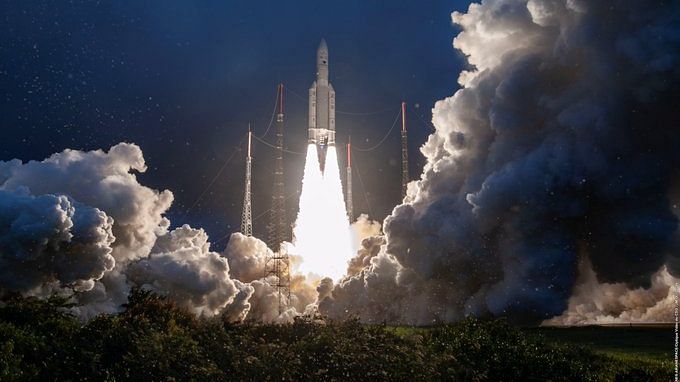Bengaluru: The Narendra Modi government will now allow greater participation of private players in a host of space activities going forward, Finance Minister Nirmala Sitharaman said Saturday as she announced reforms in eight sectors amid the coronavirus pandemic.
Sitharaman announced that private firms will be allowed to use the facilities and infrastructure at the Indian Space Research Organisation (ISRO) as a means to provide a “level playing field for satellites, launches, and space-based services”.
She added that future planetary exploration projects will also involve private participation, and a liberal geospatial data policy will be implemented to allow tech entrepreneurs to use satellite data.
Department of Space will follow Government guidelines and enable Private players to carry out space activities in the country.
— ISRO (@isro) May 16, 2020
Several of these provisions are, however, already part of the Draft Space Activities Bill of 2017. One of the main aims of the draft bill was to set up a legal and policy framework to facilitate a more productive public-private partnership in space activities. The bill is yet to be tabled in Parliament.
“The government will provide predictable policy and regulatory environment and allow private sector to use ISRO facilities. Future projects for travel in outer space or exploration of new planets will be open to the private sector. (The) Government will ease geo-spatial data policy to make such remote-sensing data more widely available to tech entrepreneurs, with safeguards put in place,” Sitharaman said in her announcement.
This echoes the draft bill, which states that there is “a need for national space legislation for supporting the overall growth of the space activities in India”.
“This would encourage enhanced participation of non-governmental/private sector agencies in space activities in India, in compliance with international treaty obligations,” says the bill.
Also read: 65% boost for MGNREGA, relief for companies from IBC — final part of Modi govt Covid package
Welcome announcement, but clarifications needed: Experts
According to space law expert Ashok G.V., a partner at Factum Law in Bengaluru, the announcement makes “all the right noise”.
“The phrase the minister used, viz. predictable policy for any industry, is one of the key characters of an investment-friendly economy and that is also the need of the hour to foster a space economy for private enterprises in India. So her message inspires hope for a radical transformation of the Indian approach to trade involving space and commerce,” he said.
However, for the new announcement to make a meaningful difference in the existing system, much needs to change, according to experts.
In 2019, ISRO had set up a new public sector company called New Space India Limited (NSIL), which is similar to Antrix, ISRO’s commercial arm. The NSIL facilitates technology and knowledge transfer between ISRO and private industry for development of the PSLV launcher — ISRO’s trustiest rocket launcher that has launched hundreds of satellites into space.
Currently, ISRO also collaborates with several hundred private players who supply parts and provide services for building vehicles.
“While it is too early to speculate, if the government is serious about giving effect to the reforms in space sector, especially in terms of access to facilities, then it is imperative that the terms of access to government space facilities, could become much more transparent, clear, affordable and in tune with market realities,” said Ashok.
There has been, however, demand that the government should clarify certain aspects of the draft bill, especially the licensing procedure for space activities. The licensing procedures mentioned in the bill has been criticised by many in the past.
According to Ashok, Section 16 of the Space Activities Bill stipulates that causing pollution or damage in space or on Earth while undertaking any space activity is a punishable offence and the offender can be sentenced to a year in prison. He added that the phrasing of the section is also “vague”, which deters private players from participating in space activities.
“When a criminal statute is worded so vaguely, Indian experience suggests that it works to deter and harass,” said Ashok.
Also read: Indian air space to open up more, benefit aviation sector by Rs 1,000 crore
Hope for drone industry in India
The new announcement seems hopeful for the drone industry in India, which is currently limited by stringent rules.
“Currently, one cannot fly a drone beyond line of sight or without losing visual contact with it,” said an engineer at an Indian company that develops drones. “Drones can fly at a maximum altitude of 150 metres from the ground.”
The engineer, who did not wish to be named, explained, “The announcement also mentioned Make in India and being ‘vocal for local’, which is theoretically very nice. But we don’t have the means to set up a supply chain for production of UAV (unmanned aerial vehicle) parts in India. Why don’t we have the ability to manufacture batteries in India? The draft bill wasn’t comprehensive enough to include this, and I hope they will consider this now.”
The lithium-ion and lithium-polymer (LiPo) batteries for drones are currently imported from China.
“Not just batteries, I’ve seen visuals of even the police coordinating Covid rescue efforts with Chinese DJI drones,” she added.
Also read: Electricity distribution companies in Union Territories to be privatised



